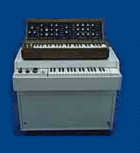






































|
Tony Allen - Jealousy/Progress 
Comments:
Tony Allen is best known as Fela Kuti's drummer. Tony and Fela met in the early 60s in London, and started playing in the same band after returning to Nigeria. Both men are responsible for the creation of Afrobeat in the early 70s. Without Fela's knowledge of Western music theory and African folk music, Tony would have never managed to create Afrobeat on his own. But without Tony's complex grooves and driving polyrhythms, Afrobeat would have probably remained an oddity in Lagos's musical scene. Tony's drumming, to my ears, is unexplainable since I'm not a drummer, yet it's so catchy that your body immediately starts doing its thing to the driving rhythms. If you look at the world of drummers both present and past, Tony stands out as an innovator and a genius. Anyway, 1975-1976 were productive years for Fela Kuti and his band. The Africa 70 released a total of 8 albums, the majority of which are considered as super classics today. But Tony still found time to borrow Fela and his musicians to record four 10-minute tracks. This CD reissue starts off with 1975's Jealousy. The "Fela-influence" is instantly noticeable seconds after the start of the CD, although it comes off sounding slightly weaker compositionally speaking. Tony's drumming here has a slightly more dominant role compared to Fela-recordings. Overall, Jealousy is a nice start, though to me ears it's no match for the follow-up LP, Progress. 1976's Progress not only features Tony at his best, but contains 2 tracks of some of the finest Afrobeat ever recorded. Not only are these compositions top-notch, and also feature stronger singing, but Fela includes several inspired sax and piano solos. The second track, "Afro Disco Beat"(don't worry there is nothing disco about this track), features infectious rhythms, and a horn melody that will stick in your head for days. The only major complaint I have here is with the packaging of the CD. This reissue features two LPs featuring two 10-minute tracks. Instead of putting everything on 1 CD which Afro-strut should have done, they instead released a digi-pack with 2 CD sleeves for each album. At 20-minute a CD, it's annoying to have to switch CDs to listen to the next 2 tracks. Other than that, enjoy some more classic Afrobeat!
Compositions(Progress is top-notch, Jealousy is a slightly weaker album): 9/10
Vocals(in English): 9/10
Recording Quality(typical of the early 70s): 10/10
Website:
Afro-strut
Segun Bucknor - Poor Man No Get Brother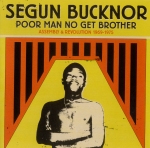
Click on the album cover to hear a sample
Comments:
Nigeria has always been known for top-notch music. But the 1970s saw an explosion of former highlife bands willing to create a unique form of Nigerian music influenced by James Brown, 60s American jazz, 50s Latin jazz, and African folk. The most famous composer to come out of that scene was, of course, Fela Kuti. Fela is the inventor, and master of Afrobeat. Thanks to music fans willing to search out and reissue lost Nigerian gems, lesser known Afrobeat bands are now being re-discovered and exposed to a larger audience, and Segun Bucknor's recordings are quite a discovery. Segun Bucknor started his career playing traditional 60s highlife. Influenced by Kuti and Brown, while taking advantage of a temporary relaxed atmosphere in Nigeria where musicians could openly record and distribute their works through Decca, Segun moved away from highlife and started experimenting more with Afrobeat and soul music. Segun, unlike Fela, stayed away from extreme forms of rebellion, and social criticism, while also embracing enough of it to push his music a little further out. As a result, half of the 12 tracks featured on this CD stay within the 3-minute mark(the time limit that music studios forced on musicians), while the other half of the tracks range between 5 to 12-minutes in length. The lyrics tend to talk about everyday Nigerian society, while mostly staying away from offensive attacks on the local government and its military. While listening to the Segun's recordings(recorded between 1969-1974), it's hard not to think about Fela. Segun, though, has a slightly different composing style. First, to my ears, the funk here is much more open than Fela's. While Fela's form of funk is majestic and dense, I found Segun's compositional style much more open, and loose. Segun equally had the talent to throw in rhythmic and melodic surprises that keep the ears constantly guessing. I found the lyrics, though, a little less interesting than Fela's, and they even remind me of Femi Kuti's lyrical style. Yet, Segun rises up a notch by throwing in 60s-soul influences into his vocal style; what Fela lacked in vocal abilities he certainly made up with charm, while Segun delivers great vocals. Overall, fans of Afro-beat's Fela Kuti, Tony Allen, and Orlando Julius should keep your eye out for this little gem.
Compositions(not as good as Fela, but this is excellent music): 10/10
Vocals(in English): 10/10
Lyrics: 8/10
Recording Quality(typical of the early 70s): 9/10
Website:
Afro-strut
Fela Kuti - Shakara/London Scene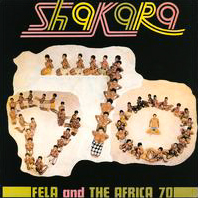
Click on the album cover to hear a sample
Comments:
Shakara/London Scene are two classic albums from 1971/1972 that
feature complex James Brown-influenced grooves, unison horn riffs, jazzy sax solos, and polyrhythmic percussion work. Listeners are instantly treated to funky 70s-grooves that last between five and thirteen minutes in length. Fela usually enters the groove by adding dissonantly jazzy electric piano chords. He likes to slowly introduce themes on keyboard while building momentum. Horns usually come in with a jazzy countermelody or state the song's main theme, while other times they introduce new themes after a composition's mid-point. The horn-riffs remind me of some of Frank Zappa's work due to their eccentric sound, but they are most likely influenced by James Brown, Miles Davis, and Charles Mingus among others. Fela does quite alot of sax soloing as well. His sax-style is rather advanced, and influenced by 50s American be-bop. Avant-jazz influences appear here and there, but they are mostly kept at a minimum in favor of a more traditional approach. Shakara starts off with one of Fela's best known song. "Lady" is absolutely stunning from beginning to end. The sound here, as on "Shakara", mixes the James Brown-sound with strong African folk influences. Both compositions start with a long 5-minute instrumental section before Fela begins a catchy verse in broken-English, and Yoruba. The chorus sections on both tracks feature traditional African "call-and-response" between Fela and about a dozen of his wives. Lyrics at this point in time poked fun at a modernizing African society. But Fela would soon start to focus on increasing problems with the Nigerian government, criticize European and American imperialism, and make fun of religious fanaticism. London Scene turns the James Brown-influence up a notch and delivers five tracks that simply smoke from beginning to end. They feature fast tempos, furious horn-work(with loads of Puerto Rican and Cuban influences), and driving multi-layered percussion. These five tracks were re-makes of an apparent 1969 session in Los Angeles (which was released recently). But I heard that London Scene blows the original away. Overall, this CD is the best place to start.
Compositions: 10/10
Vocals(in English and Yoruba): 10/10
Recording Quality: 9/10
Fela Kuti - Expensive Shit/He Miss Road
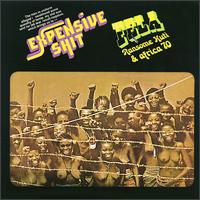
Click on the album cover to hear a sample
Comments:
The music on Expensive Shit is very similar to Shakara, but the obvious "James Brown" influence was making way for an even more original style. Fela had his sights on creating African classical music; this "classical" sound would be uniquely African. As a result, the grooves, and themes were simply getting stronger with time, and Fela started favoring longer composition-lengths. In fact, at this point, 10-minutes songs were considered short. Soloing was taking an important role in the music. There is no denying that Fela's soloing skills on keyboards were improving. But his skills on the sax, by this time, had reached an advanced level, and he could have easily held his own against some of the great American jazz musicians. He Miss Road continues exploring the same musical style as on Expensive Shit, yet it seems to drag from the 17-minute "It's No Possible". Fela quickly figured out how to keep long songs from getting boring on future albums. At this stage, though, he was still inexperienced. This CD is recommended after Shakara/London Scene, and Opposite People/Sorrow Tears, and Blood.
Compositions: 9/10
Vocals(in English and Yoruba): 10/10
Recording Quality: 9/10
Fela Kuti - Opposite People/Sorrow, Tears, and Blood
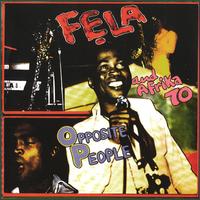
Click on the album cover to hear a sample
Comments:
Opposite People/Sorrow Tears And Blood are my favorite albums from Fela. Although I would recommend Shakara/London Scene as a good introduction to Fela's music, this reissue is recommended as a follow-up. "Opposite People" starts off with a bluesy, yet swinging, guitar-riff. The musical style is very similar to Shakara. But the listener will instantly notice the furious sax soloing by Fela, and some of his musicians, that makes Opposite People smoke. The focus on composition, and creating grooves, is high on all four tracks. Sorrow Tears And Blood was the first album released by Fela after his initial troubles with the Nigerian government. His increasing criticism of the military goverment forced them to raid his home and confiscate newly recorded masters. Fortunately, after a lengthy court battle, those master tapes were returned and released. A masterpiece!
Compositions: 10/10
Vocals(in English): 10/10
Recording Quality: 10/10
Fela Kuti - Coffin for Head of State

Comments:
This Fela CD consists of one 22-minute track, and another 30-minute track. But, these track-lengths were not that unusual for Fela compositions, since albums featured songs that lasted twenty-plus minutes. In fact, during live performances, some songs were extended over an hour! At this point Fela's home in Nigeria had been attacked and burned by government forces. Fela, most of his musicians, and several neighbors were severely beaten. His mother was even thrown out of a second floor window, and eventually died from her injuries. And, as a result, the music, at least for the next couple of years, became much more subdued, somber, and angry. Unfortunately, his state-of-the-art recording studio, along with many master tapes, were also destroyed during the attack, and the sound-quality on this release clearly suffers from lower quality compared to earlier albums. And, althougth there is some great music on this album, some of the magic of earlier releases seems to be lost. The jamming is fairly interesting, but Coffin For The Head Of State doesn't offer anything new. The formula is basically the same, yet stripped of several layers. I recommend buying this CD after checking out earlier albums.
Compositions: 7/10
Vocals(in English): 8/10
Recording Quality: 7/10
Fela Kuti - Original Suffer Head/I.T.T.
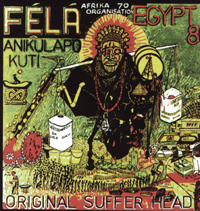
Click on the album cover to hear a sample
Comments:
If someone asked me if Fela ever put out a flawless "masterpiece", I would recommend this CD. The compositions on both albums feature some of Fela's most complex, original, and funkiest music released up to that point. His original idea of creating African classical music had reached a new level of maturity. "Original Suffer Head", released in 1982, starts off with Hammond-organ lines which might remind the listener of Emerson, Lake, and Palmer. That is before the music enters a section that will remind some of the French progressive rock band Magma. Like Christian Vander's music, Fela rides a complex groove as his wives shout out words at irregular intervals. About five minutes later the band falls into one of the most infectious grooves that I've ever heard which also makes-up the majority of the album. The first ten minutes of that groove features a 10-piece horn section, and energetic solos from son Femi, two sax players(alto, and baritone), and Fela himself. "Power Show" is a mellow, yet funky, 14-minute piece featuring more of Fela's organ playing, and interplay between solo sax and his 10-piece horn section. On the CD, it serves as a great interlude for the two lenghty epics. "I.T.T.", or International Thief Thief in this case, is another funk masterpiece, and it's used as a vehicle for Fela's verbal assault on Nigeria's corrupt "International Telephone, and Telegraph" company. Here he not only denounces the director of I.T.T, but also accuses a former Nigerian president of being a thief and "man of low mentality". Keep in mind that Nigeria at the time was ruled a by dictator and his military. And Fela had been attacked by that military several times between 1978-1982. Anyway, music does not get better than this my friends. This is some of the most powerful funk and jazz ever recorded. And I seriously doubt that it will ever be surpassed.
Compositions: 10/10
Vocals(in English): 10/10
Recording Quality: 10/10
|
